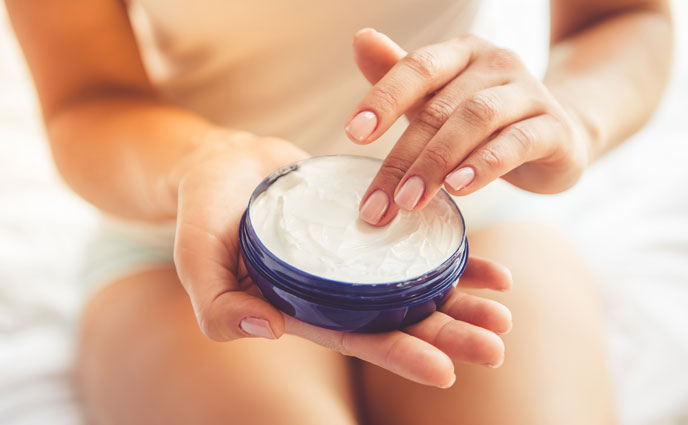Our skin can become dehydrated for a number of reasons. The most obvious, perhaps, is that we're not moisturizing as regularly as we ought to. Not-so-obvious contributors to dehydrated skin include: using really hot water to wash your face, not exfoliating regularly, free radical damage caused by UV rays and pollution, and — you guessed it — not drinking enough water.
If we don't address those factors, then things only become worse. For a closer look at what, exactly, happens to our skin when it's dehydrated, we asked skin experts to weigh in.
Image via Imaxtree
Before we dive into what happens when our skin becomes dehydrated, let's first discuss the difference between dehydrated and dry skin. Though easily conflated, the two aren't one in the same.
"Dry skin is a skin type, and generally lacks natural oil production. Dehydration simply means that your body is losing more water than it's taking in," explains celebrity esthetician Natalie Aguilar. "Unlike dry skin, dehydrated skin is easily treatable. Drinking water and modifying our lifestyle can bring that bouncy glow back into our skin. I always say, 'You are what you eat and you feel what you drink!'"
Conversely, dry skin is trickier to "treat" since it's a type. It heavily relies on emollients, oils, and creams to protect the skin's barrier from further moisture loss and to provide relief from irritation, tightness and flakiness. Even though drinking plenty of water doesn't have much influence on dry skin, it is still extremely important to keep our body hydrated.
Image via Imaxtree
This is a cyclical issue that really needs to be nipped in the bud. When your skin is dehydrated, it doesn't function as well as it ought to. It struggles to produce enough sebum and to sweat, which makes it harder for your body to eliminate gunk per usual. This, in turn, makes your skin more susceptible to external damage and can even worsen conditions such as eczema and psoriasis. When your skin barrier is damaged, it struggles even more to retain water.
"A compromised barrier not only weakens our immune system, but increases levels of inflammation," says Dr. Sarah Dolder, a board-certified dermatologist at Greenwich Point Dermatology. "Our skin is not only our protection from the world around us, but it is also our most external layer that is visible to the world. It reflects our health, our beauty and our vitality."
Image via Imaxtree
In addition to the risk of infection and inflammation associated with dehydrated skin, Dr. Dolder also stresses that dehydrated skin can leave our complexion looking dull and lackluster. This is a direct result of not getting enough moisture via water/diet, and from not consistently moisturizing.
Image via Imaxtree
Dullness isn't the only thing you have to worry about with dehydrated skin. That lack of moisture can also lead a worsening of fine lines and wrinkles. Though drinking water and wearing moisturizers won't make existing fine lines and wrinkles go away completely, they can visibly improve your appearance. Plumping skin ingredients — such as hyaluronic acid, which draws moisture from the air to your skin — can have an immediate visible effect. Drinking those daily eight glasses of water helps, too.
Image via Imaxtree









